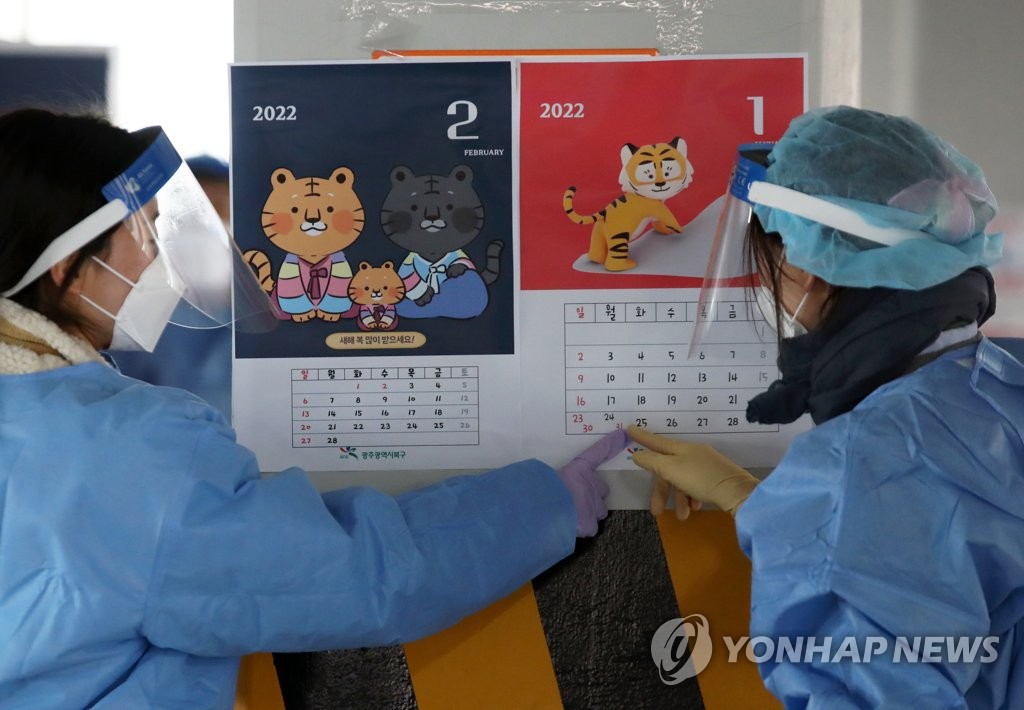- California Assembly OKs highest minimum wage in nation
- S. Korea unveils first graphic cigarette warnings
- US joins with South Korea, Japan in bid to deter North Korea
- LPGA golfer Chun In-gee finally back in action
- S. Korea won’t be top seed in final World Cup qualification round
- US men’s soccer misses 2nd straight Olympics
- US back on track in qualifying with 4-0 win over Guatemala
- High-intensity workout injuries spawn cottage industry
- CDC expands range of Zika mosquitoes into parts of Northeast
- Who knew? ‘The Walking Dead’ is helping families connect
Daily virus cases stay below 4,000 for 2nd straight day amid tighter antivirus curbs
South Korea’s daily coronavirus cases stayed below 4,000 for the second straight day Monday as the country has extended the enforcement of its tighter social distancing measures for two more weeks to stem a surge in infections and the spread of the omicron variant.
The country added 3,129 new COVID-19 infections, including 2,993 local infections, raising the total caseload to 642,207, according to the Korea Disease Control and Prevention Agency (KDCA).
This marked the second straight day that the daily cases fell below 4,000 following 3,833 infections reported Sunday.
South Korea reported 36 more COVID-19 deaths, raising the death toll to 5,730, the KDCA said. The fatality rate stood at 0.89 percent.
The number of critically ill COVID-19 patients came to 1,015, down nine from a day earlier. Critical cases have stayed above 1,000 for 14 consecutive days, with their all-time high hitting 1,151 on Wednesday.
Weekend infection figures are usually smaller than those on weekdays in part due to less testing, but the pace of the spread of the virus appears to be slowing down slightly recently as the government has maintained tighter social distancing curbs.
As of 6 p.m. Monday, South Korea had reported 2,238 additional cases, down by 38 from the same time Sunday.
Daily cases are tallied through midnight and announced the following morning. The country has averaged 4,365 cases per day over the past week.
In early November, the government eased long-enforced restrictions on private gatherings and business operations as part of efforts to return to normalcy in phases under the “living with COVID-19″ scheme.
The daily cases, however, soared to a record high of 7,848 on Dec. 15, prompting the government to reimpose antivirus regulations days later for two weeks.
The restrictions were originally supposed to end Sunday but the government has extended the enforcement of those rules, including a four-person cap on private gatherings across the nation and a 9 p.m. business hour curfew on cafes and restaurants, for two more weeks through Jan. 16.
The move came amid concerns over surging COVID-19 cases and the spread of the potentially more transmissible omicron variant, whose first case in South Korea was reported on Dec. 1.
On Monday, South Korea confirmed 111 more omicron variant infections, bringing the total to 1,318. Among them, 101 omicron variant cases came from overseas and 10 were locally transmitted.
Health authorities reported that two omicron patients, both of them in their 90s, have died while receiving treatment at hospitals in Gwangju, some 330 km south of Seoul.
They marked the first cases of omicron variant patients dying in South Korea. It is still unclear whether the omicron variant was the direct cause of their deaths.
Meanwhile, of the 2,993 locally transmitted COVID-19 cases, Seoul reported 964, while 894 came from the surrounding Gyeonggi Province and 177 from Incheon, a port city west of Seoul.
The number of cases from overseas came to 136, raising the total to 17,731.
A total of 42.6 million people, or 83 percent of the country’s 52 million population, have been fully vaccinated, and 18.5 million, or 36 percent, have received booster shots, the KDCA said.

Medical workers talk to each other while pointing to calendars for 2022, the Year of the Tiger in the Chinese zodiac, as they prepare to administer coronavirus tests at a screening clinic in the southwestern city of Gwangju on Dec. 30, 2021. (Yonhap)











